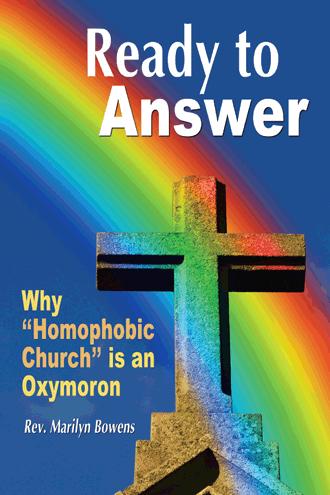In her new pamphlet, Ready to Answer: Why “Homophobic Church” Is an Oxymoron, former attorney and US Metropolitan Community Church minister Marilyn Bowens lays out an impassioned case against religious homophobia.
Why “Homophobic Church” Is an Oxymoron is a provocative subtitle, especially for a book released in the midst of the ongoing theological culture wars. In today’s reality, the statement is provably false: a Catholic Church led by a vile homophobic pontiff, a Mormon Church whose hateful demagogy successfully (though temporarily) passed Proposition 8, and innumerable national and international pulpits spewing a steady stream of anti-gay bile. It’s clear that the phrase “homophobic church” is often accurate, but is it possible that the phrase might be objectively oxymoronic? Bowens’ slight volume does much to assert the good reverend’s indignation and moral outrage but does little to dismantle the justifications for religious hatred.
In her introduction, Bowens states that she hopes that some “accusers” – her preferred term for anti-gay scriptural literalists – will read her book, “even if their original intent is . . . to play ‘scripture war games,’ pitting each reference to scripture that I make against one that they choose to ‘prove’ me wrong.” With this, Bowens makes a rod for her own back. At every turn her own authority comes from scripture. In her authoritarian tone, she ends up assuming the pose of the fanatic herself. She is certainly morally superior to ludicrous hate-mongers like Fred Phelps, but she is no less absolutist in her pronouncements.
In Bowens’ world, for lack of any properly fleshed out evidence, her biblical exegesis is superior simply because she declares it so. She attempts to separate “the word” – that is, man’s interpretation of God’s will – and “the Word,” or God made manifest on earth in the figure of Jesus of Nazareth. Fair enough, except that Bowens constantly returns to “the word(s)” to justify her arguments. Of course, the fact that she has no other source of evidence is the very problem to begin with; “the words” are, in the end, the only available account of “The Word.” Bowens doesn’t present any real evidence for why her à la carte interpretation of the Bible is any more true than that of “the Accusers’.”
However, my major objection with Bowens’ rhetorical style comes in her continual invocation of John 3:16, which reads, “For God so loved the world that he gave his only begotten Son that whosoever believeth in him should not perish, but have everlasting life.” Bowens’ message of inclusion is, as in most every religion one can name, based on the language and tactics of exclusion. In the chapter “The Accuser Within,” Bowens describes a “reprobate” as someone “who [has] no regard for God” and then adds the offensive and fatuous pronouncement that “they do not care about right and wrong.” Bowens muses that reprobates are unlikely to read her book. Excuse me, Ms Bowens, but speaking as a reprobate myself, I find it extremely obnoxious and self-defeating to construct an argument about inclusion on such prejudicial, exclusionary and morally judgmental grounds.
She writes later that “I am blessed to witness, and participate in, a ministry movement that preaches and teaches God’s radically inclusive, unconditional love for all humanity.” I’m not sure what version of Yahweh she is acquainted with, but if Bowens is going to call herself a follower of Jesus Christ — who, in John 14:6, tells us that “I am the way, and the truth, and the life; no one comes to the Father but through Me” and threatens in Matthew 25:41 that unbelievers must “Depart from me, ye cursed, into everlasting fire” – then I won’t have her talking about radical inclusion and unconditional love unless she is willing to openly repudiate the Gospels as an authoritative source of God’s “Word.” It seems to me that Bowens, and many other queer Christians, would be much happier negotiating their own personal relationships to spirituality and rejecting theism in favour of deism, thus dispensing with hateful, stultifying holy texts altogether.
Toronto’s MCC congregation has done countless good works for gay and lesbian Christians, even housing the Triangle Program in the lower levels of its church. However, this can’t take away the sting of Bowens’ exclusionary religious language. She states that she hoped not to “write a weak imitation” of the small field of queer Christian scholarship. Despite her best intentions, that is precisely what she has done. An intellectually sophisticated, theologically rooted and personally impassioned book on Christian hatred toward homosexuals is of dire importance in this era of gay teen suicides and Canadian Catholic school trustees comparing GSAs to Nazi groups: a statement that, given the cozy history between the Catholic Church and 20th-century fascism, I would recommend extreme caution in repeating.
However, and sadly, Ready to Answer is simply not that book.

 Why you can trust Xtra
Why you can trust Xtra


